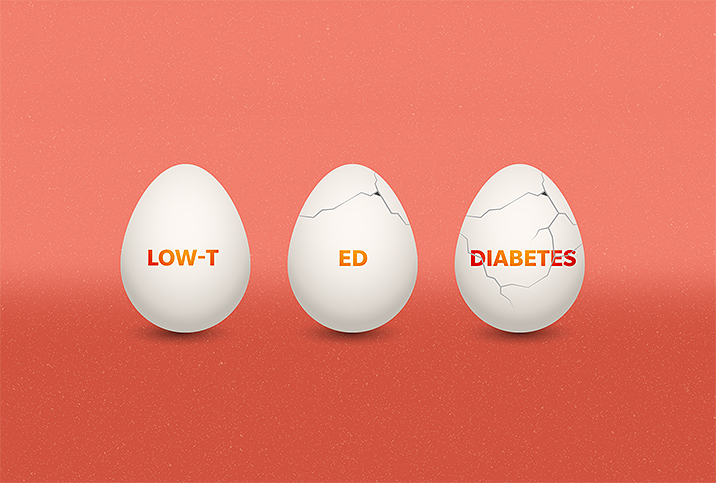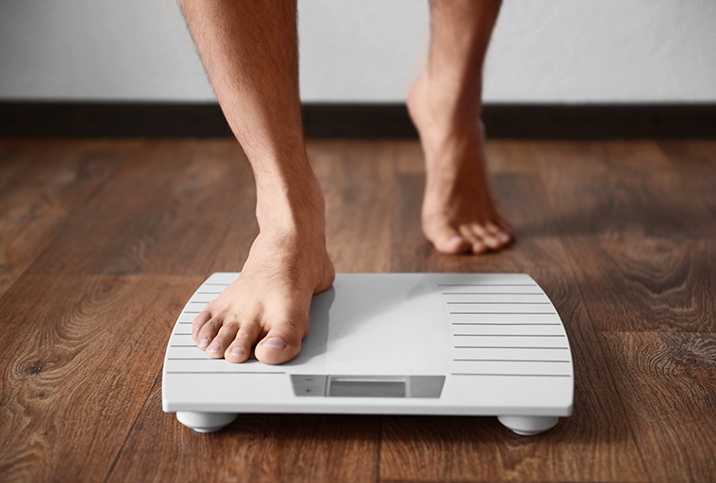Which Came First: Low-T, ED or Diabetes?

Though they may seem easy to come by, erections involve a complex network of hormones, physical systems and mental responses. If any one of those components isn't working, it's hard—pardon the pun—to get an erection. Throw conditions such as diabetes into the mix, and the situation can be complicated even further.
"Most commonly, when I see a man with diabetes who's going in to have his testosterone checked, it's because his erections aren't working," said Petar Bajic, M.D., a urologist at the Center for Men's Health at the Glickman Urological and Kidney Institute in Cleveland. "And even if the testosterone is low, a lot of times we get it back up to normal and it doesn't necessarily restore that function because there is some damage that's been done there because of the diabetes."
Bajic said that while there's a higher rate of low testosterone among men with diabetes, the question of whether the diabetes is causing the low-T is not always easy to answer.
The relationship between hypogonadism, also known as low testosterone or low-T, and diabetes is well established. However, it's not clear whether diabetes causes low-T or it's the other way around.
What we do know is that men with diabetes are more likely to have low-T, and men with low-T are more likely to develop diabetes, a disease that affects the body's ability to produce insulin, leading to high blood sugar.
Neel Parekh, M.D., a clinical assistant professor in the urology department at the Cleveland Clinic, said about one-third of men with type 2 diabetes have low testosterone.
Perhaps counterintuitive to many people, however, low-T is not one of the most common causes of ED, Bajic said. Those culprits are high blood pressure, high cholesterol, tobacco use and, yes, diabetes.
"When it comes to diabetes, there is certainly an association with low testosterone," he said. "But when we specifically talk about the erections, it's more the diabetes that's causing the problem."
Diabetes can have serious consequences
Parekh sees many patients who have signs of poorly controlled diabetes, including neuropathy, which causes decreased sensation in the fingers and toes.
"The nerves of the penis are even smaller than the nerves in the fingers and toes, so the penis has likely already been affected," he said. "If you want to prevent worsening of erectile dysfunction, unless you get things under control, your only treatment is going to be surgery for a penile implant if you let it go too long."
Some of the nerve damage caused by diabetes is irreversible, Parekh said, stressing that patients need to take steps to improve their blood sugar control so they can prevent irreversible harm to their sexual function.
If diabetes is diagnosed early and properly managed with a healthy diet, medication, insulin injections and exercise, men with diabetes may be able to restore sexual function.
Bajic recommends regular exercise, preferably moderate to vigorous cardio work for 45 minutes three times a week, to improve blood flow in men with diabetes and sexual dysfunction or low-T.
"There's been research that shows some degree of erectile dysfunction can be reversed by that type of exercise when done in a regular and sustained fashion over several months," Bajic said.
Getting a good night's sleep is critical as well, he advised, as a healthy sleep-wake cycle is essential for normal testosterone production.
Can testosterone replacement therapy help?
Millions of American men are prescribed testosterone replacement therapy (TRT), usually in the form of a gel or injection, to restore levels of the hormone.
Bajic noted that TRT candidates need to meet two requirements: low testosterone, defined as an early-morning level of fewer than 300 nanograms per deciliter (n/dL), and at least one low-T symptom, such as low libido, ED, fatigue, difficulty losing fat or difficulty gaining muscle.
Both Bajic and Parekh said studies have indicated that TRT may prevent the progression from prediabetes to diabetes or even better control existing diabetes.
"We know that [TRT] helps with fat loss and muscle gain, and, eventually, if that's for a sustained period in a man who is diabetic, may lead to remission," Bajic said.
A study published in the journal Diabetes Care suggested that six months of TRT in men with type 2 diabetes led to improved insulin resistance and sexual function. A 2019 meta-study, published in the World Journal of Men's Health, analyzed more than 1,700 articles and 84 trials and found that TRT for men with type 2 diabetes led to improved sexual function, quality of life, bone density and muscle mass.
Parekh said increased libido is the primary benefit of TRT in men with diabetes.
"There can be some mild improvement in erectile function with TRT, but I do counsel patients who often still require sildenafil or tadalafil, Viagra or Cialis for the erectile function," he said.
TRT is not without its risks, most notably a link to infertility because the treatment can lead to a decline in sperm production. For this reason, Parekh recommends that men who are planning to have children within the next few years consider other options.
"There are alternatives to testosterone therapy that I utilize," he said. "Human chorionic gonadotropin (hCG), clomiphene, anastrozole are all medications that are not FDA-approved, so it's off-label, but can treat the low testosterone and also preserve sperm production."
Further research is needed
Parekh would like to see more research on whether treating low-T in men with prediabetes would prevent or slow the rate of developing type 2 diabetes. And Bajic noted that he'd like to see researchers find ways to better identify which men with diabetes would benefit from earlier TRT intervention.
"Any research to further build on the association and awareness of the relationship between these two conditions, I think, is going to lead to better diabetic control, more effective treatment and, importantly, prevention," Bajic said.


















